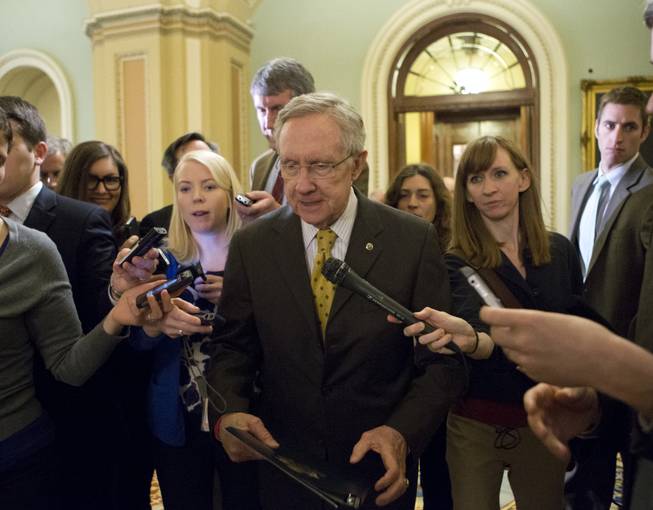
Associated Press
Senate Majority Leader Harry Reid, D-Nev., retreats to a closed-door meeting with fellow Democrats as Senate Minority Leader Mitch McConnell, R-Ky., and he work to negotiate a legislative path to avoid the “fiscal cliff” on Sunday, Dec. 30, 2012.
Sunday, Jan. 6, 2013 | 2 a.m.
Sun Archives
WASHINGTON -- For the past four years, whenever the clock ticked down to the final hours before a government shutdown or default deadline, President Barack Obama put the ball in Sen. Harry Reid’s hands.
Reid has been the reliable quarterback of the Democratic team, taking Obama’s policies and strategizing how to run them through Congress like a football coach’s plays, while keeping his squad disciplined and in line.
It has, for the most part, been a winning strategy: While there have been plenty of close scrapes, Congress hasn’t yet failed to fund the federal government or forced the country to renege on its financial obligations.
But the "fiscal cliff" debacle seems to have changed that dynamic -- perhaps for good. From now on, if coach Obama wants his team to keep running his policies, he’s going to have to start donning a jersey.
“The president’s got to show the caucus that he’s willing to engage,” said a senior Democratic aide with close knowledge of the fiscal cliff negotiations. “It can’t just be (Reid) saying all the time, ‘Oh yeah, the president supports this.’ You come tell them yourself.”
•••
The road to the fiscal cliff deal was “the worst” some aides in Congress and the White House had seen matters get during Obama’s first term, which had already been marked by a protracted battle over the health care law and had endured several standoffs on the country’s fiscal woes.
It was also the first time in Obama’s presidency that a member of the presidential team -- in this case, Vice President Joe Biden -- showed up to personally pitch Democrats on the final deal in the hours before the critical vote.
Ultimately, the fiscal cliff deal prevented 99 percent of Americans from seeing their tax rates rise by permanently extending the Bush tax cuts for incomes up to $400,000, or $450,000 for couples filing jointly.
But tax rates, which were poised to spike on Jan. 1, were only half of the problem. The other half of the fiscal cliff was the across-the-board “sequestration” cuts to federal spending, also scheduled for Jan. 1.
The eventual deal delayed those cuts for two months -- setting up yet another fight over fiscal problems at the same time the country is also expected to hit the debt ceiling, a cap on borrowing that may prevent the federal government from paying its bills.
Democrats in Reid’s caucus had no appetite for a repeat showdown. And Reid had no appetite for selling them on it.
“The caucus is already thinking about the debt limit debate,” the senior Democratic aide said.
“Sen. Reid’s point to the president was ... you’ve got to come up and talk to them about this and you’ve got to reassure them that you’ve already been thinking about the debt-limit debate,” the aide said. “That we’re not going to go through what we went through last year.”
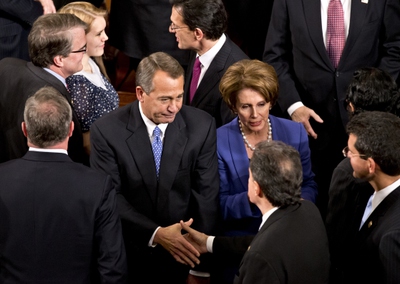
House Speaker John Boehner of Ohio enters the House of Representatives chamber on Capitol Hill in Washington, Thursday, Jan. 3, 2013, after surviving a roll call vote in the newly convened 113th Congress. He is escorted by House Majority Leader Eric Cantor of Virginia, and House Minority Leader Nancy Pelosi of California.
On Dec. 28, Reid, Minority Leader Mitch McConnell, House Speaker John Boehner and House Democratic Leader Nancy Pelosi met with Obama in the Oval Office. It was on that trip that Boehner now famously told Reid to “Go f--- yourself,” as first reported by Politico. On that day, Obama also formally handed over the deal-making reins to McConnell and Reid.
McConnell and Reid had a better track record hashing out fiscal issues than Obama and Boehner, who had tried to strike a deal on the debt ceiling in 2011 and on the fiscal cliff in the first half of December. Both attempts failed.
In the meeting, McConnell proposed letting tax rates rise above $1 million, instead of the $250,000 threshold Democrats -- in particular Obama -- angled for throughout the election, and asked for changes to estate taxes.
The president balked -- if he wasn’t going to get a grand bargain, he didn’t like the sound of those numbers, or the idea of sweetening the estate tax for Republicans.
“He spent six months running around the country campaigning and he mentioned ($250,000) everywhere he went,” a White House aide explained.
Reid hated the idea, but was willing to talk about it.
“As Sen. Reid said, ‘Hey, you want to get going here, you want to make a deal? You’ve got to give a little bit and you’ve got to make something work here,’” the senior Democratic aide said.
Huddling in the Oval Office after the other congressional leaders had gone, Reid and Obama decided to present McConnell with a choice: Either trade his estate-tax proposal for a $400,000 income threshold on the tax rates, or insist on his estate tax and accept the Democrats’ $250,000 level on taxes.
Over the next 36 hours, the counteroffers flew. McConnell came down to $750,000 (for couples). Reid crept up to $350,000. McConnell came down to $550,000, and asked to pay for unemployment insurance and a delay of sequestration cuts by reconfiguring the calculation for Social Security payments. Reid said no way.
By Saturday night, Reid was at the $400,000 income threshold that would be in the final deal and had agreed to a separate vote on estate taxes. His office promised their next counteroffer by Sunday morning.
But then Reid went to church with his wife -- and McConnell accused Reid of dragging his heels.
“There was a point where Senate Democrats were slow-walking the process,” said a Republican aide. “They were more interested in scoring political points than they were in a result.”
In public, this was plausibly the case. Reid was keeping a low profile, and when he did surface, he sounded blithely bleak about prospects for a deal, but reminded that Democrats had already passed a bill preventing a middle class tax hike.
Behind the scenes, however, Democratic congressional and White House aides said it was Reid leading Obama closer toward the Republicans. On Sunday, Reid reached the limit of how far he thought he could string along a fitful Democratic caucus, which thought they had won the right to the $250,000 income threshold in the 2012 election.
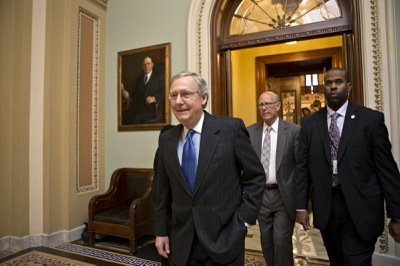
Senate Minority Leader Mitch McConnell, R-Ky., followed by Sen. Pat Roberts, R-Kan., second from right, leaves the Senate chamber to meet with fellow Republicans in a closed-door session as the "fiscal cliff" negotiations continue at the Capitol in Washington, Sunday, Dec. 30, 2012. Leaders in the Senate and the House are under pressure to find a legislative path to head off the automatic tax hikes and spending cuts set to take effect Jan. 1, 2013.
On Sunday afternoon, McConnell placed the first phone call to Biden, with a plea to help finish the compromise -- though, it would turn out, Reid had mostly brokered the final version.
“There’s a little bit of good cop-bad cop going on here,” the senior Democratic aide said. “It was well expected McConnell would be angry, and it wasn’t a shock that he was going to call Biden.”
Once the call was came, according to a White House aide, Reid “basically turned over the conversations to the White House.”
“(Reid) stepped aside and asked the vice president to step in and negotiate a deal,” the aide said. “If that meant putting the vice president in a position where he needed to intervene, then that was what he was willing to do.”
But Reid had a request for Biden too: If he was going to be involved, then once the deal was finalized, Biden had to come down to Capitol Hill, on New Year’s Eve, to convince Democrats the fiscal deal wouldn’t set them up for another impossible fight.
“Sen. Reid’s point to the president was: ‘I can’t sell them on it because you’re the one who is going to make the request on the debt limit,’” the senior Democratic aide said. “It had gotten to the point where Sen. Reid had done so much of the carrying of the water that he was like, ‘you know, you’ve got to come tell them yourself.’”
Democratic Senators who were in that meeting described an emphatic Biden and a comparatively quiet Reid.
“Sen. Reid basically said that each person could vote the way their conscience was,” said Sen. Chuck Schumer of New York. “But I think when people walked into the room most of them had made up their mind ... it was better than going over the cliff.”
Others, like Sen. Chris Coons of Delaware, said it was still clear that Reid “was urging us to support the deal.”
Reid had handed the bullhorn to Biden who, ever the enforcer of rank and order, informed Senate Democrats that he would not tolerate any procedural shenanigans on the floor.
Eventually, the Senate voted 89-to-8 for a deal that had a $40,000 higher individual income tax threshold than Democrats had last proposed, and 5 percent higher estate taxes than what Republicans had wanted.
Republicans made a point of crediting Biden, not Reid, for the deal.
“The fact that McConnell and Biden worked this out tells you everything you need to know,” a Republican aide added, when asked about Reid’s role through the last round of Biden-McConnell negotiations.
“They’re complaining because they didn’t like our answer,” a senior Democratic aide said when told about that remark. “But at the end of the day what they’re not telling everybody is, we agreed to the same deal. We barely got anything from Biden.”
•••
In the summer of 2011, after Reid struck the debt ceiling deal, he told the Sun that he still thought it was “lousy.”
This time, aides say, the merits of the fiscal cliff deal -- and how it was struck -- will only be clear as Congress heads into the next round of the fight.
“The deal in a vacuum is fine, but we’re now going to head to the debt limit and we need a good strategy for how we’re going to deal with that,” a senior Democratic aide said. “It is clear, at least, that things are going to have to start more in the Senate, less in the House.”
That’s not a power grab. Boehner has, according to numerous reports, told House Republicans he’s through negotiating one-on-one with Obama, after two failed attempts. Democrats argue they failed because Boehner walked away from the table.
But Reid has a flock that is getting noticeably restless -- even, if when push comes to shove, they vote on the party line.
Both before and after the fiscal cliff passed, Senate Democrats lined up to publicly register their discontents with the legislation.
In Obama’s first term, Reid managed such events alone, for the sake of protecting Obama and maintaining the Democratic Party’s brand in an election year. But in the second term, he’s looking for a little more personal engagement from Obama.
“The president doesn’t have a good reputation of coming up and glad-handing and talking to members,” said a senior Democratic aide.
Even when it is critical to whip votes, a presidential trip to the White House isn’t without its pitfalls: Too few visits and a president can be considered aloof; too many and the president can look weak and pleading.
For now, the White House is willing to dispatch Biden to the Hill again when needed; in the future, they may even be willing to dispatch the president himself.
“I think it is entirely dependent on the situation -- I definitely wouldn’t rule it out,” said a White House aide. “But I think it’s hard to take a playbook from one situation and run exactly the same play in a new situation.”
Part of the decision, the aide continued, will be made based on how public opinion seems to be swaying. Right now, both Obama and congressional Democrats enjoy a higher approval rating than congressional Republicans.
“The president will continue to be publicly making the case about what it is he’s been fighting for,” the aide said.
If Obama starts showing up to push his policies in person on Capitol Hill as well, the aide added, it won’t just be to throw his weight around with Democrats.
“We’re essentially talking about 536 people. You’ve got 535 in Congress, all of them worried about their reelection and there’s one other guy, the president, who’s not,” the White House aide said. “That gives him a little bit more leverage. And that’s why -- frankly -- Republicans have to be concerned about running the same plays as they ran before.”
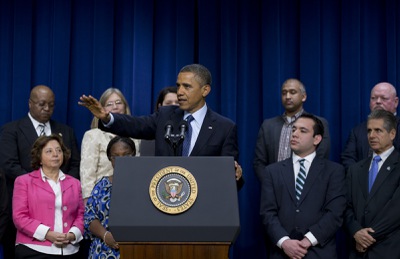
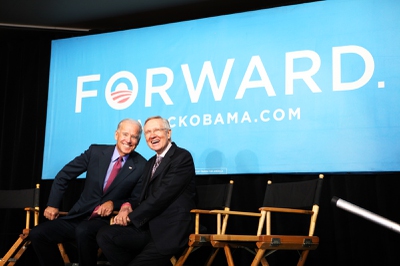
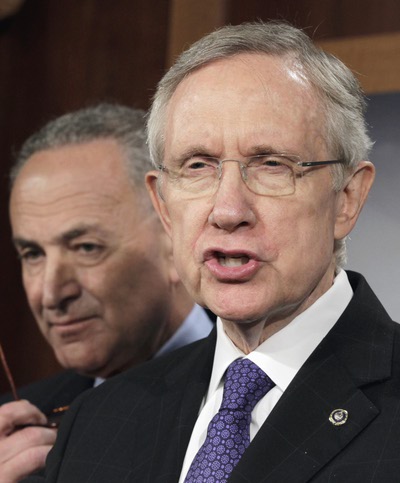

Join the Discussion:
Check this out for a full explanation of our conversion to the LiveFyre commenting system and instructions on how to sign up for an account.
Full comments policy